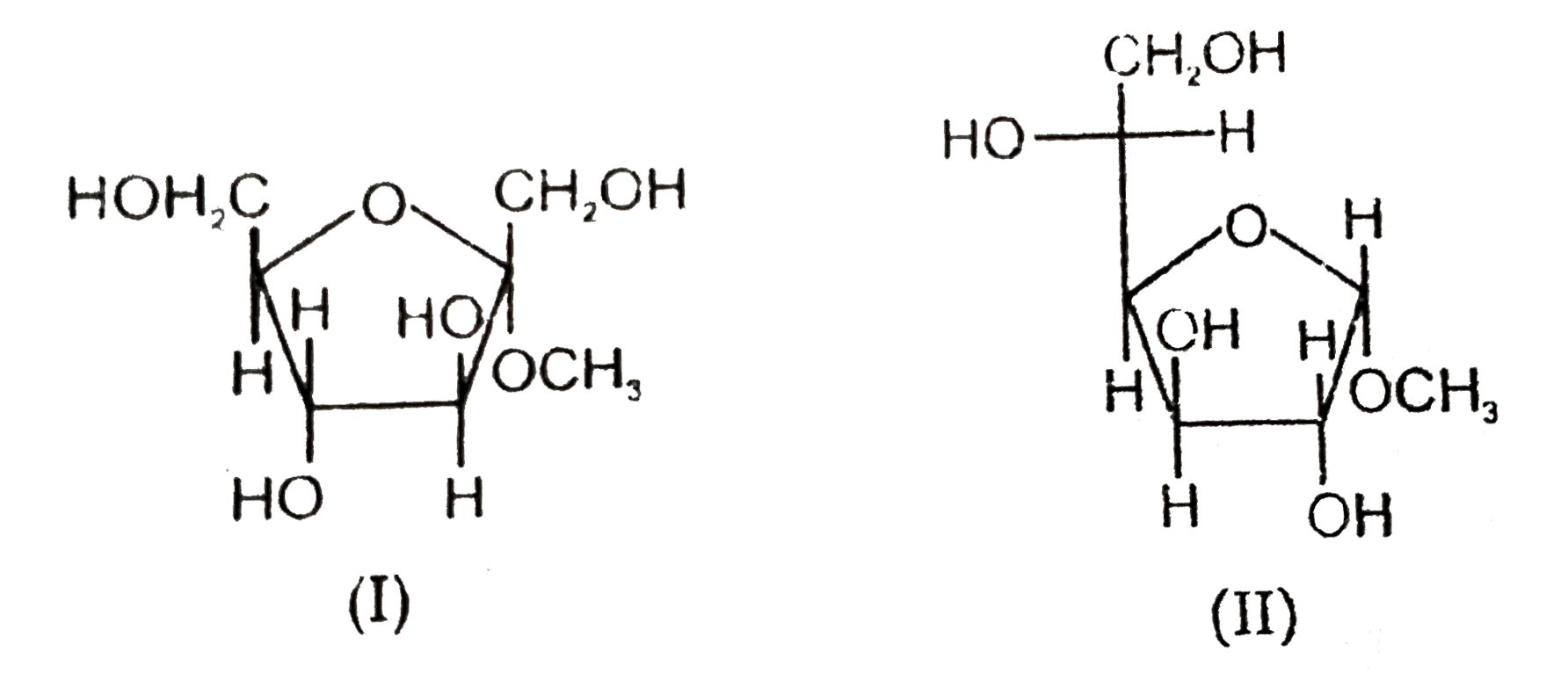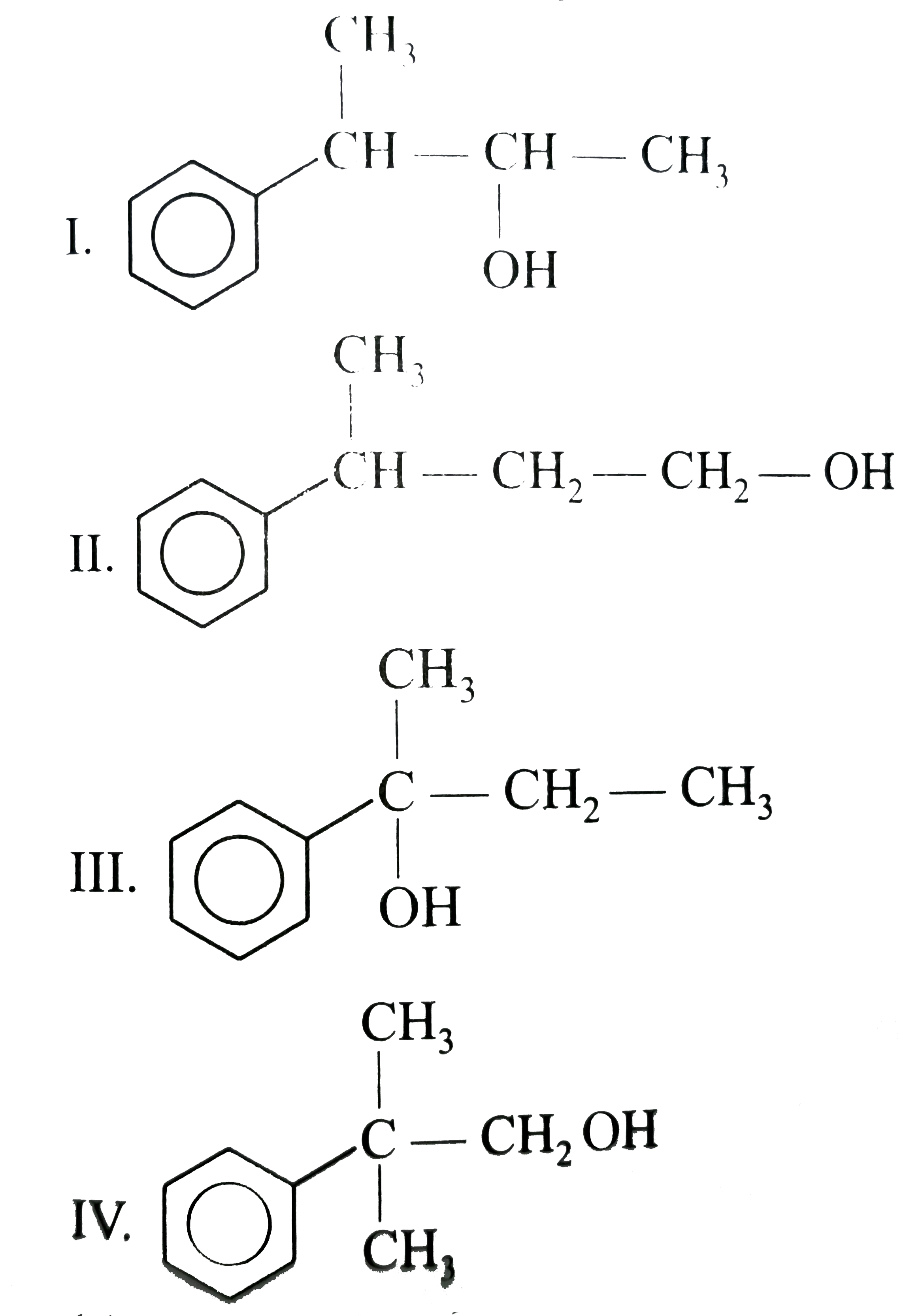Acid catalysed dehydration of t-butanol is faster than that of n-butanol because
tertiary carbocation is more stable than primary carbocation
primary carbocation is more stable than tertiary carbocation
t-butanol has a higher boiling point
rearrangement takes place during dehydration of t-butanol.
The correct Answer is:A
To understand why the acid-catalyzed dehydration of t-butanol is faster than that of n-butanol, we need to analyze the mechanism of the reaction and the stability of the carbocations involved.
1. Identify the Reactants:
- The two alcohols in question are t-butanol (tert-butanol) and n-butanol (normal butanol).
- Tert-butanol has the structure (CH₃)₃COH, while n-butanol has the structure CH₃CH₂CH₂OH.
2. Understand the Reaction Conditions:
- The dehydration of alcohols is typically carried out using a strong acid, such as concentrated sulfuric acid (H₂SO₄).
- This acid protonates the hydroxyl group (-OH) of the alcohol, making it a better leaving group.
3. Formation of Carbocations:
- When t-butanol is treated with H₂SO₄, the protonation of the hydroxyl group leads to the formation of a tertiary carbocation (C⁺), which is highly stable due to hyperconjugation and inductive effects from the surrounding alkyl groups.
- Conversely, when n-butanol undergoes the same reaction, it forms a primary carbocation, which is less stable because it has fewer alkyl groups to stabilize the positive charge.
4. Stability of Carbocations:
- Carbocation stability follows the order: tertiary > secondary > primary.
- The tertiary carbocation formed from t-butanol is more stable than the primary carbocation formed from n-butanol.
5. Rate of Reaction:
- The rate of the dehydration reaction is directly related to the stability of the carbocation formed. A more stable carbocation will lead to a faster reaction.
- Therefore, since the tertiary carbocation is more stable than the primary carbocation, the dehydration of t-butanol occurs at a faster rate than that of n-butanol.
6. Conclusion:
- The correct answer to the question is that the dehydration of t-butanol is faster than that of n-butanol because the tertiary carbocation is more stable than the primary carbocation.
- The two alcohols in question are t-butanol (tert-butanol) and n-butanol (normal butanol).
- Tert-butanol has the structure (CH₃)₃COH, while n-butanol has the structure CH₃CH₂CH₂OH.
- The dehydration of alcohols is typically carried out using a strong acid, such as concentrated sulfuric acid (H₂SO₄).
- This acid protonates the hydroxyl group (-OH) of the alcohol, making it a better leaving group.
- When t-butanol is treated with H₂SO₄, the protonation of the hydroxyl group leads to the formation of a tertiary carbocation (C⁺), which is highly stable due to hyperconjugation and inductive effects from the surrounding alkyl groups.
- Conversely, when n-butanol undergoes the same reaction, it forms a primary carbocation, which is less stable because it has fewer alkyl groups to stabilize the positive charge.
- Carbocation stability follows the order: tertiary > secondary > primary.
- The tertiary carbocation formed from t-butanol is more stable than the primary carbocation formed from n-butanol.
- The rate of the dehydration reaction is directly related to the stability of the carbocation formed. A more stable carbocation will lead to a faster reaction.
- Therefore, since the tertiary carbocation is more stable than the primary carbocation, the dehydration of t-butanol occurs at a faster rate than that of n-butanol.
- The correct answer to the question is that the dehydration of t-butanol is faster than that of n-butanol because the tertiary carbocation is more stable than the primary carbocation.
Topper's Solved these Questions
- BOOK - NCERT FINGERTPS ENGLISHCHAPTER - ALCOHOLS,PHENOLS AND ETHERSEXERCISE - HOTS7videos
ALCOHOLS,PHENOLS AND ETHERS
- BOOK - NCERT FINGERTPS ENGLISHCHAPTER - ALCOHOLS,PHENOLS AND ETHERSEXERCISE - EXEMPLAR PROBLEMS14videos
ALCOHOLS,PHENOLS AND ETHERS
- BOOK - NCERT FINGERTPS ENGLISHCHAPTER - ALDEHYDES, KETONES AND CARBOXYLIC ACIDSEXERCISE - Assertion And Reason15videos
ALDEHYDES, KETONES AND CARBOXYLIC ACIDS
Similar Questions
Knowledge Check
- Question 1 - Select One
The major product of acid catalysed dehydration of 2-methylcyclohexanol and butan-1-ol are respectively
A1-methylcyclohexene and but-1-eneB2-methylcyclohexene and but-2-eneC2-methylcyclohexene and butaneD1-methylcyclohexene and but-2-ene. - Question 2 - Select One
Phenol is a weaker acid than acetic acid because :
Aphenoxide ion is better stabilized by resonance than acetate ionBacetate ion is better stabilized by resonance than phenoxide ionCphenol is less soluble in water than acetic acidDboth phenoxide ion and acetate ion are equally stable - Question 3 - Select One
A tertiary alcohol H upon acid catalysed dehydration gives a product I. Ozonolysis of I leads to compound J and K. Compound J upon reaction with KOH gives benzyl alcohol and a compound L, whereas K on reaction with KOH gives only M.

Compound H is formed by the reaction of :A B
B C
C D
D
Predict the major product of acid catalysed dehydration of
(i) 1-methylcyclohexanol and (ii) butan-1-olView SolutionStatement-1 : Methyl α−D-fructofuranoside (I) undergoes acid catalysed hydrolysis at faster rate than that of methyl α−D-glucofuranoside (II)
(I)
Statement-2 : The intermediate in glycoside hydrolysis is carbocation which 3∘ in case of I and 2∘ in case of (II).View SolutionPhenol is more acidic than alcohol because :
View Solution(a) Predict the major product of acid catalysed dehydration of 1-Methylcyclohexanol.
(b) You are given benzene, conc. H2SO4,NaOH and did. HCI. Write the preparation of phenol using these reagents.View SolutionPhenol is a weaker acid than acetic acid because:
View Solution


